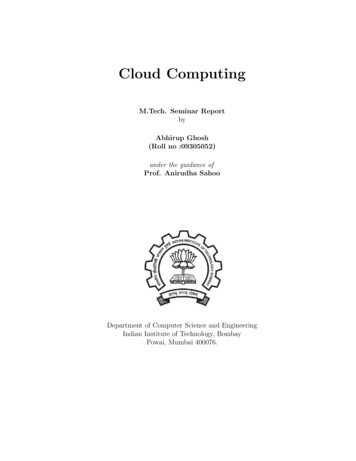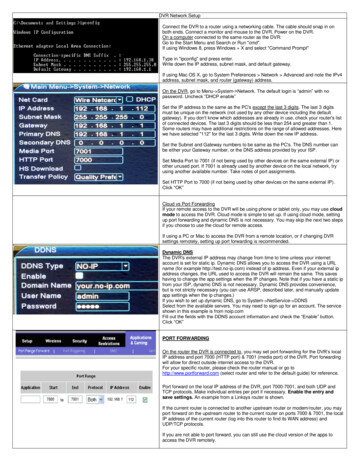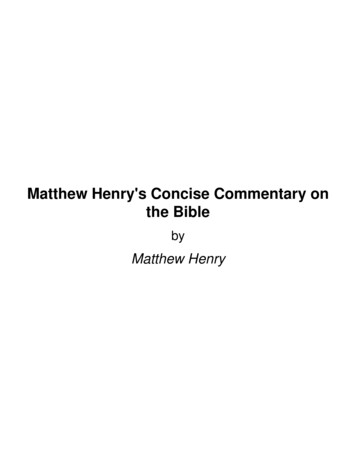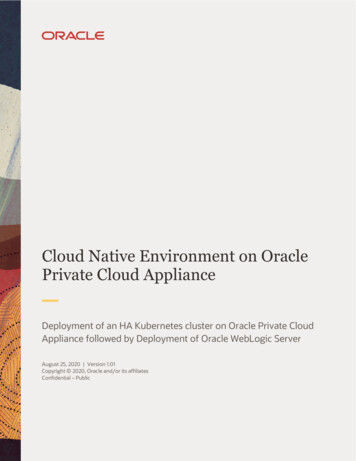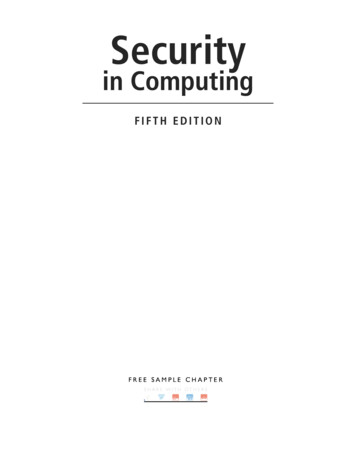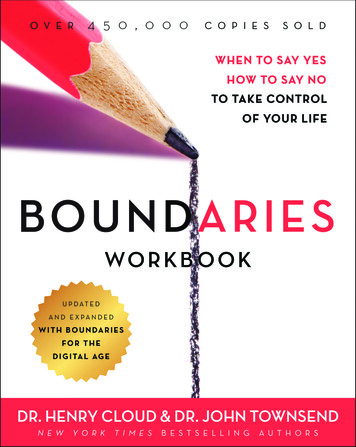
Transcription
Resources by Henry Cloud and John TownsendBoundariesBoundaries WorkbookBoundaries audioBoundaries video curriculumBoundaries in DatingBoundaries in Dating WorkbookBoundaries in Dating audioBoundaries in Dating curriculumBoundaries in MarriageBoundaries in Marriage WorkbookBoundaries in Marriage audioBoundaries in Marriage curriculumBoundaries with KidsBoundaries with Kids WorkbookBoundaries with Kids audioBoundaries with Kids curriculumHow to Have That Difficult ConversationHow People GrowHow People Grow WorkbookHow People Grow audioMaking Small Groups WorkMaking Small Groups Work audioOur Mothers, OurselvesRaising Great KidsRaising Great Kids for Parents ofPreschoolers curriculumRaising Great Kids Workbookfor Parents of PreschoolersRaising Great Kids Workbookfor Parents of School- Age ChildrenRaising Great Kids Workbookfor Parents of TeenagersRaising Great Kids Audio Pages Safe PeopleSafe People Workbook12 “Christian” Beliefs That CanDrive You CrazyResources byDr. John TownsendResources byDr. Henry CloudHiding from LoveBoundaries with TeensThe Entitlement CureBeyond BoundariesChanges That HealChanges That Heal WorkbookChanges That Heal audio9780310352778 BoundariesWkbk int.indd 212/20/17 10:13 AM
ZONDERVANBoundaries WorkbookCopyright 1995, 2018 by Dr. Henry Cloud and Dr. John TownsendRequests for information should be addressed to:Zondervan, 3900 Sparks Dr. SE, Grand Rapids, Michigan 49546ISBN 978-0-310-35277-8 (softcover)ISBN 978-0-310-35290-7 (ebook)All Scripture quotations, unless otherwise indicated, are taken from The Holy Bible, New International Version , NIV .Copyright 1973, 1978, 1984, 2011 by Biblica, Inc. Used by permission of Zondervan. All rights reserved worldwide.www.Zondervan.com. The “NIV” and “New International Version” are trademarks registered in the United States Patentand Trademark Office by Biblica, Inc. Scripture quotations marked NASB are taken from the New American Standard Bible . Copyright 1960, 1962, 1963,1968, 1971, 1972, 1973, 1975, 1977, 1995 by The Lockman Foundation. Used by permission. (www.Lockman.org).Any Internet addresses (websites, blogs, etc.) and telephone numbers in this book are offered as a resource. They are notintended in any way to be or imply an endorsement by Zondervan, nor does Zondervan vouch for the content of these sitesand numbers for the life of this book.All rights reserved. No part of this publication may be reproduced, stored in a retrieval system, or transmitted in any form orby any means— electronic, mechanical, photocopy, recording, or any other— except for brief quotations in printed reviews,without the prior permission of the publisher.Published in association with Yates & Yates, www.yates2.com.Art direction: Curt DiepenhorstInterior design: Denise FroehlichFirst printing December 2017 / Printed in the United States of America9780310352778 BoundariesWkbk int.indd 412/20/17 10:13 AM
ContentsIntroduction. . . . . . . . . . . . . . . . . . . . . . . . . . . . . . . . . . . . . . . . . . . . . . . . 7Part OneWhat Are Boundaries?1. What Does a Boundary Look Like?. . . . . . . . . . . . . . . . . . . . . . . . . . 112. Understanding Boundaries. . . . . . . . . . . . . . . . . . . . . . . . . . . . . . . . . 313. Ten Laws of Boundaries. . . . . . . . . . . . . . . . . . . . . . . . . . . . . . . . . . . 514. Common Boundary Myths. . . . . . . . . . . . . . . . . . . . . . . . . . . . . . . . . 71Part TwoBoundary Conflicts5. Boundaries and Your Family . . . . . . . . . . . . . . . . . . . . . . . . . . . . . . . 916. Boundaries and Your Friends. . . . . . . . . . . . . . . . . . . . . . . . . . . . . . 1077. Boundaries and Your Spouse. . . . . . . . . . . . . . . . . . . . . . . . . . . . . . 1198. Boundaries and Your Children. . . . . . . . . . . . . . . . . . . . . . . . . . . . . 1359. Boundaries and Work. . . . . . . . . . . . . . . . . . . . . . . . . . . . . . . . . . . . 15510. Boundaries and the Digital Age. . . . . . . . . . . . . . . . . . . . . . . . . . . . 16711. Boundaries and Yourself . . . . . . . . . . . . . . . . . . . . . . . . . . . . . . . . . 18312. Boundaries and God . . . . . . . . . . . . . . . . . . . . . . . . . . . . . . . . . . . . 195Part ThreeDeveloping Healthy Boundaries13. Resistance to Boundaries. . . . . . . . . . . . . . . . . . . . . . . . . . . . . . . . . 20714. Success with Boundaries. . . . . . . . . . . . . . . . . . . . . . . . . . . . . . . . . . 2239780310352778 BoundariesWkbk int.indd 512/20/17 10:13 AM
IntroductionOne of the most serious problems facing Christians today is confusion about boundaries.Many sincere, dedicated believers struggle with tremendous confusion about when it is biblically appropriate to set limits. When confronted with their lack of boundaries, they raisegood questions:Can I set limits and still be a loving person?What are legitimate boundaries?What if someone is upset or hurt by my boundaries?How do I answer someone who wants my time, love, energy, or money?Why do I feel guilty or afraid when I consider setting boundaries?How do boundaries relate to submission?Aren’t boundaries selfish?Why is it difficult for me to hear no from other people?Why do I tend to want to control other people when I don’t get what I want?Just as homeowners set physical property lines around their land, we need to set mental,physical, emotional, and spiritual boundaries for our lives to help us distinguish what is ourresponsibility and what is not. The inability to set appropriate boundaries at appropriatetimes with the appropriate people can be very destructive.Misinformation about what the Bible says about boundaries can also be destructive. Tocounter such wrong thinking, this study guide and the accompanying text present a biblicalview of boundaries: what they are, what they protect, how they are developed, how they areinjured, how to repair them, and how to use them. As you read the book and work throughthis guide, you will find answers to the questions listed above— and more. In fact, our goalis to help you use biblical boundaries appropriately to achieve the relationships and purposesthat God intends for you as you grow in him.Dr. Henry CloudDr. John TownsendNewport Beach, California9780310352778 BoundariesWkbk int.indd 712/20/17 10:13 AM
Part OneWhat AreBoundaries?99780310352778 BoundariesWkbk int.indd 912/20/17 10:13 AM
Chapter 1What Does a BoundaryLook Like?Give Me Something to Hope ForIt’s sometimes easier to see in other people the very thing we would do well to change inourselves. Look again at Sherrie’s day. Read through the entries from 6:00 a.m. to 11:50p.m. and see how closely your life resembles her boundaryless day (pp. 15–26).1 Where do you see yourself in Sherrie’s actions and thoughts? Be as specific as possible. Who in your life could be cast in the role of Sherrie’s mother (p. 16); her husband,Walt (pp. 17, 22–25); her “friend,” Lois (p. 18); her demanding boss, Jeff (p. 19); theencouraging teacher, Mrs. Russell (pp. 19–20); her unreachable daughter, Amy (p. 21);and the ministry leader, Phyllis, with yet another request (p. 22)? Who treats you the waythese people treated Sherrie? Whose words and actions elicit the same kind of response(emotional and otherwise) from you that these people elicited from Sherrie?1 All page numbers in this workbook refer to the page numbers of the 2017 edition of Boundaries. When no pagereferences are given for italicized text, it usually means that these sections are additional thoughts of the author on thatparticular topic.119780310352778 BoundariesWkbk int.indd 1112/20/17 10:13 AM
What Are Boundaries? How did you respond to the way Sherrie used Scripture as she made decisions that violatedher— at best— shaky boundaries? If Sherrie came to you for advice, what would you say to her? How would you diagnoseher problem? Which of your own words of advice would you do well to heed?We can probably all identify with Sherrie’s dilemma— her isolation, her helplessness, herconfusion, her guilt. And, above all, her sense that her life is out of control. Trying harderisn’t working for her. Being nice out of fear isn’t working for her. Taking responsibility forothers isn’t working for her. Sherrie still suffers severely from her inability to take ownership of her life. She has great difficulty knowing what things are her responsibility and whatthings are not. In her desire to do the right thing or to avoid conflict, she ends up taking onproblems that God never intended her to take on (pp. 26–27). Look at your life through this lens. What problems have you taken on that God maynever have intended you to take on? What motivated you to take on those problems you just listed— your desire to do the rightthing, your efforts to avoid conflict, your fear of disappointing someone or not beingliked, a sense of guilt, an inner “should,” or something else?Any confusion of responsibility and ownership in our lives is a problem of boundaries (p.27).129780310352778 BoundariesWkbk int.indd 1212/20/17 10:13 AM
What Does a Boundary Look Like? Why are you confused about boundaries— about when and how to draw them foryourself or even whether drawing boundaries is okay? What has happened to foster thatconfusion? Why are Christians especially susceptible to confusion about boundaries?The questions listed in the introduction and below reflect some of the confusion weChristians may have about boundaries.Can I set limits and still be a loving person?What are legitimate boundaries?What if someone is upset or hurt by my boundaries?How do I answer someone who wants my time, love, energy, or money?Why do I feel guilty or afraid when I consider setting boundaries?How do boundaries relate to mutual submission in marriage?Aren’t boundaries selfish?Is it difficult for me to hear no from other people?Do I tend to want to control other people when I don’t get what I want? Which of these questions have you wondered about? Which questions do you especiallywant answers for? What do you want to gain from this study besides answers to those questions? Whathopes and goals do you have for yourself?139780310352778 BoundariesWkbk int.indd 1312/20/17 10:13 AM
What Are Boundaries?As you proceed through this study and work toward the goals you have set for yourself,remember that this book aims to help you see the deeply biblical nature of boundaries asthey operate in the character of God, his universe, and his people. Remember, too, that ourgoal is to help you use biblical boundaries appropriately so that you can experience therelationships and achieve the purposes that God intends for you as his child.A Little Boundary ClarificationRemember the story of Joshua (pp. 29–31)? His parents paid his bills, fretted over his circumstances, worried about his future, and exerted much energy to keep him going. Joshuadidn’t study, plan, or work, yet he had a nice place to live, plenty of money, and all therights of a family member who was doing his part. He was irresponsible and happy— andthey were responsible and miserable.And remember how we helped his parents see that? We compared Joshua to a manwho never watered his lawn. Whenever his neighbors turned on their sprinkler system, thewater fell on Joshua’s lawn. Their grass was turning brown and dying, but Joshua saw hisgreen grass and thought his yard was doing fine. We suggested that they define the propertylines a little better and fix the sprinkler system so that water would fall on their own lawn.Perhaps then, when Joshua didn’t water his lawn and found himself living in dirt, he wouldrecognize that he had a problem and would do something about it (p. 30). Where are you watering someone else’s yard while your own grass withers and dies? Where are you letting someone else water your yard? Is it cruel to stop watering someone else’s yard? Would it be cruel for the person who iswatering your yard to stop? Why or why not?149780310352778 BoundariesWkbk int.indd 1412/20/17 10:13 AM
What Does a Boundary Look Like?Invisible Property Lines and ResponsibilityIn the physical world, boundaries are easy to see. In the spiritual world, boundaries are justas real, but often harder to see (p. 31). What boundaries in the physical world do you deal with every day? What kind of boundaries do you think need to exist in the spiritual world? Why are spiritual boundaries as important as physical boundaries?The goal of this lesson is to help you define your intangible boundaries and to recognizethem as an everpresent reality that can increase your love and save your life. These boundaries define your soul and help you guard and maintain it (Proverbs 4:23) (p. 31).Me and Not MeBoundaries define us. They define what is me and what is not me. A boundary showswhere you end and someone else begins, leading to a sense of ownership. We have to dealwith what is in our soul (Proverbs 14:10), and boundaries help us define what that is. TheBible tells us clearly what our parameters are and how to protect them, but often our familyor other past relationships have confused us about our parameters (pp. 31–32). Explain how knowing what you are to own and take responsibility for gives you freedom.159780310352778 BoundariesWkbk int.indd 1512/20/17 10:13 AM
What Are Boundaries? Why does pain result when we are not shown the parameters of our soul or are taughtwrong parameters?To and ForWe are responsible to others and for ourselves. What does Galatians 6:2 teach about responsibility to others? When has someone in your life followed Christ’s example of sacrificial love and deniedhimself or herself in order to do for you what you could not do for yourself? When have you followed Christ’s example of sacrificial love and denied yourself in orderto do for others what they could not do for themselves?Now look at Galatians 6:5. The Greek words for burden and load give important insightinto these two verses. Burden means “excess burdens,” boulders that we need help carrying. Load means “cargo” or “the burden of daily toil.” These loads are like knapsacks. Aknapsack is possible to carry, and we are expected to carry our own. We are expected todeal with our own feelings, attitudes, and behaviors, as well as the responsibilities Godhas given us, even though it takes effort. In addition, we are not to carry the knapsacks ofothers (Luke 9:23) (pp. 32–33). When have you acted as if your “boulders” are your daily load and have refused help?Where are you doing this today?169780310352778 BoundariesWkbk int.indd 1612/20/17 10:13 AM
What Does a Boundary Look Like? When have you acted as if your “daily load” is a boulder that you shouldn’t have to carry?Where are you doing this today? What have these two questions helped you see about yourself— and what will you do withwhat you have learned?In order to not stay in pain or become irresponsible, it is important that you determinewhat “me” is, where your boundary of responsibility lies, and where someone else’s begins.Let’s look more closely now at the nature of boundaries (p. 33).Good In, Bad OutBoundaries help us distinguish our property so that we can take care of it. We need to keepthings that will nurture us inside our fences and keep things that will harm us outside. Weneed to keep the good in and the bad out, and that’s what boundaries help us do (p. 33). The fences around our property— our boundaries— need gates in them so that we can letout the bad when it is inside. What pain and sin do you need to get out through confessionso that it does not continue to poison you on the inside (Mark 7:21–23; James 5:16;1 John 1:9)? We also need those gates to let in the good that may be on the outside. We need, forinstance, to receive Jesus and his truth (John 1:12; Revelations 3:20). We also need toopen up to the good things other people want to give us (2 Corinthians 6:11–13). Whatgood things— from Jesus and his people— would you like to be able to receive?179780310352778 BoundariesWkbk int.indd 1712/20/17 10:13 AM
What Are Boundaries?Clearly, boundaries are not meant to be walls. The Bible does not say that we are to be“walled off” from others; in fact, it says we are to be “one” with them (John 17:11). We areto be in community with one another, but in every community the members have their ownspace and property (p. 34). As a result of past injury, have you reversed the function of boundaries? Where are youusing them to keep the bad in and the good out? What pain are you holding inside ratherthan expressing it and getting it out of your soul? Where are you not opening up to thelove and support from the outside that would bring healing?God and BoundariesThis concept of boundaries comes from the very nature of God. God defines himself as adistinct, separate being, and he is responsible for himself (pp. 34–35). God defines his personality by telling us about himself. What does he tell us in the Bibleabout what he thinks, feels, plans, allows, doesn’t allow, likes, and dislikes? See, forinstance, Genesis 12:2; Jeremiah 3:12; Ezekiel 6:9; 36:26. God differentiates himself from his creation, from us, and from others. He tells us whohe is and who he is not. What does he say about himself in Leviticus 11:44; Isaiah 48:12;60:16; 1 John 4:16? God also limits what he will allow in his yard. What, for example, do Exodus 20:1–17and Matthew 5:21–6:4 say about those limits?189780310352778 BoundariesWkbk int.indd 1812/20/17 10:13 AM
What Does a Boundary Look Like? What do Hosea 6:6, Micah 6:8, Mark 12:30–31, and 1 John 4:7–12 say about the gatesin God’s fences?God also has boundaries within the Trinity. The Father, the Son, and the Spirit are one, butat the same time they are distinct persons with their own boundaries. Each has his ownpersonhood and responsibilities, as well as a connection and love for one another (John17:24). We, whom he created in his likeness and whom he gave personal responsibilitywithin limits, need to develop boundaries like God’s if we are to be effective stewards overthe life he has given us (p. 35).Examples of BoundariesA boundary is anything that helps to differentiate you from someone else or shows whereyou begin and end (p. 35). Review the discussion of each type of boundary listed below (pp. 35–40). Then, for eachone, note some biblical support (what does the Bible say or what example does it givefor maintaining these boundaries?). Refer to a time when people honored that particularboundary of yours (what were the circumstances, why were you able to be strong, andwhat did you learn from this experience?), and consider what hinders you from keepingeach boundary strong (look back at a time when people didn’t honor your boundary andtry to identify why). Skin Words, especially the word no Truth199780310352778 BoundariesWkbk int.indd 1912/20/17 10:13 AM
What Are Boundaries? Geographical distance Time Emotional distance Other people Consequences Now consider the list of boundaries from another perspective. Which boundaries, when they are set by other people, do you need to do a betterjob honoring? Why might you have a hard time honoring people’s boundaries, especially certain ones?209780310352778 BoundariesWkbk int.indd 2012/20/17 10:13 AM
What Does a Boundary Look Like? What will you do to be more respectful of the boundaries of the people in your life?What’s within My Boundaries?The story of the Good Samaritan (Luke 10:30–37) is a good illustration of when boundariesshould be both observed and violated. The imaginary next chapter of the story, however,shows what happens when, moved with compassion to give to someone in need, we findourselves manipulated into giving more than we want to give and, as a result, becomeresentful and angry— and sometimes we may be the ones doing the manipulating! Thatscenario can be avoided when we clearly understand what falls within our boundaries andwhat we are responsible for (pp. 40–42).FeelingsFeelings should neither be ignored nor placed in charge. They are signals that alert usto be aware of the condition of our heart. The Bible says to “own” your feelings and beresponsible for them. You must see them as your property so you can begin to find ananswer to whatever issue they are pointing to. They can often motivate you to do muchgood (Matthew 9:36; 15:32; Luke 10:33; 15:20) (p. 42). What do you tend to do with your feelings— ignore them or let them be in charge? Whydo you think you respond that way? What do you tend to do with feelings of anger? If you are nursing any feelings of anger right now, what problem that needs to be addressedare they pointing you toward? What will you do about that problem?219780310352778 BoundariesWkbk int.indd 2112/20/17 10:13 AM
What Are Boundaries?Attitudes and BeliefsAttitudes have to do with your orientation toward something, the stance you take towardGod, others, life, work, and relationships. Beliefs are anything you accept as true. Althoughyou may struggle to set limits and accept appropriate responsibility, know that doing sowill save lives (Proverbs 13:18, 24) (pp. 42–43). You are the only one who feels the effects of your attitudes and beliefs, and you are theonly one who can change those attitudes and beliefs. Which attitudes and beliefs that youhold are causing you to make poor choices or experience pain? What will you do to getthose attitudes and beliefs in line with God’s truth? Do you tend to feel responsible for other people’s feelings, choices, and behaviors? Inwhat areas of your life or for which people in your life do you do this? What will you doto gain a better understanding of what you really are responsible for?BehaviorsBehaviors have consequences. As Paul says, “A man reaps what he sows” (Galatians 6:7–8).As Proverbs warns, “stern discipline awaits anyone who leaves the path” (15:10). To rescuepeople from the natural consequences of their behavior is to render them powerless (p. 43). When has someone interrupted the law of sowing and reaping in your life and protectedyou from consequences that could have been good teachers? What happened?229780310352778 BoundariesWkbk int.indd 2212/20/17 10:13 AM
What Does a Boundary Look Like? When have you interrupted the law of sowing and reaping in someone’s life and protectedthat person from consequences that could have been good teachers? What happened?ChoicesWe need to take responsibility for our choices. Doing so leads to the fruit of self- control(Galatians 5:23). A common boundary problem is disowning our choices and trying tolay the responsibility for them on someone else. Throughout the Scriptures, people arereminded of their choices and asked to take responsibility for them (Joshua 24:15; Matthew20:13; Romans 8:13; 2 Corinthians 9:7; Philemon 1:14) (pp. 43–44). How often do you use the phrases “I had to” or “He/she made me” when you explainwhy you did or didn’t do something? What choices in your life have you failed to take responsibility for? Whom are you blamingfor what circumstances of your life?ValuesWhat we value is what we love and assign importance to. Often we do not take responsibility for what we value. Boundaries help us not to deny but to own our old hurtfulboundaries so that God can create a new heart in us, a heart that values things that willsatisfy and things that will last (pp. 44–45). When have you been caught up in valuing the approval of people rather than the approvalof God (John 12:43)? What lesson did you learn from that experience or from seeingsomeone else caught in that trap?239780310352778 BoundariesWkbk int.indd 2312/20/17 10:13 AM
What Are Boundaries? Where might you be seeking power, riches, or pleasure in an attempt to satisfy yourdeepest longing, which is really for love? How would taking responsibility for loving thewrong things affect your life?LimitsTwo aspects of limits are important for creating better boundaries. First, setting limits andseparating ourselves protects love because we are taking a stand against things that destroylove. Second, setting limits in order to establish an internal structure is an important component of boundaries and identity, as well as ownership, responsibility, and self- control(pp. 45–46). The first aspect is setting limits with others. That means setting limits on our exposure topeople who are behaving poorly, and God is our model for doing so (Matthew 18:15–17;1 Corinthians 5:9–13). We can’t change other people or make them behave right, but wecan gain some distance from them. Where in your life today would you do well to limityour exposure to someone? Why would that be a wise move? What is keeping you fromdoing so? Like setting limits with others, setting our own internal limits helps us create betterboundaries. We need self- control without repression. What destructive desires do youneed to learn to say no to? What good desires do you need to learn to say no to becausethe timing isn’t right?Resources and GiftsAlthough it uses money as an example, Matthew 25:14–30 clearly illustrates our God- ordained responsibility for ownership and stewardship of our resources, talents, and gifts.Our talents are within our boundaries and are our responsibility, yet taking ownership249780310352778 BoundariesWkbk int.indd 2412/20/17 10:13 AM
What Does a Boundary Look Like?of them is often frightening and always risky. It takes work, practice, learning, prayer,resources, and grace to overcome the fear of failure that can keep us from exercising ourtalents, but we are accountable— and much happier— when we exercise our God- givengifts and are productive (p. 46). What talents, gifts, and abilities has God given you? If you’re not sure, ask someone whoknows you well to help you identify them. What talents, gifts, and abilities are you currently exercising? How do you feel aboutwhat you are doing? What talents, gifts, or abilities are you afraid to exercise? What is the root of those fears?What steps will you take to overcome those fears?ThoughtsOur minds and thoughts are important reflections of the image of God. We are called tolove God with all our mind (Mark 12:30), and we are to “take captive every thought tomake it obedient to Christ” (2 Corinthians 10:5). We must have our own thoughts, wemust keep learning about God, we must clarify any distorted ideas, and if we want othersto know what we’re thinking, we must tell them (pp. 46–47). We must own our own thoughts. Do you think things through for yourself, or do youtend to accept other people’s ideas and let them do your thinking for you? Why? Nameone area of your life where you would do well to think through some issues for yourself.259780310352778 BoundariesWkbk int.indd 2512/20/17 10:13 AM
What Are Boundaries? We must grow in knowledge and expand our minds. What are you doing to grow in yourknowledge of God and his Word? Of God and his creation? How are you using yourbrain to glorify God? We must clarify distorted thinking, and the easiest distortions to notice are those inpersonal relationships. Consider past relationships. Where do you see now that you haddistorted ideas about the person involved? Where might you now be failing to see peopleas they really are? Finally, we need to make sure that we are communicating our thoughts to others. After all,“For who knows a person’s thoughts except their own spirit within them?” (1 Corinthians2:11). Whom are you expecting to be able to read your mind? To whom are you afraid tocommunicate your thoughts? What do you think keeps you from doing so?DesiresEach of us has different desires and wants, dreams and wishes, goals and plans, hungers andthirsts— but few of us are satisfied. One reason is that we lack the internal structure thatboundaries provide to enable us to define and then take the specific steps necessary to reachour goals. Furthermore, we often do not actively seek our desires from God (Ecclesiastes11:9; Matthew 7:7–11; Philippians 2:12–13; James 4:2–3). Yet God is truly interested inour desires. He made them, and “he fulfills the desires of those who fear him” (Psalm145:19; see also Psalm 21:2–3; 37:4) (pp. 48–49).269780310352778 BoundariesWkbk int.indd 2612/20/17 10:13 AM
What Does a Boundary Look Like? When have you experienced the fulfillment of a God- given desire? Be specific about thecircumstances and your feelings. What desires are you currently pursuing that your heavenly Father, wise parent that he is,is probably not interested in giving you? Consider the desires, dreams, and goals that you are currently pursuing. Make themthe focus of some prayer time, asking God to refine your ideas and redirect you wherenecessary.LoveOur ability to give and respond to love is our greatest gift. The heart that God has fashioned in his image is the center of our being. Its abilities to open up to love and to allowlove to flow outward are crucial to life. We need to claim our hearts as our property andwork on our weaknesses, whether we are weak receiving, or weak giving, love. Doing sowill open up life to us (pp. 49–50). Why might you have difficulty giving and/or receiving love? Our loving heart, like our physical one, needs an inflow as well as an outflow of lifeblood(Matthew 22:37, 39; 2 Corinthians 6:11–13). How healthy is the inflow in your life?What healthy, godly relationships nurture you?279780310352778 BoundariesWkbk int.indd 2712/20/17 10:13 AM
What Are Boundaries? How healthy is the outflow of love in your life? Where are you giving to others the kindof unconditional love God has given you? What do your answers to the previous two questions tell you about the condition of yourtrust muscle? Are you resisting love and/or failing to give love because it’s hard for youto trust?Feelings, attitudes and beliefs, behaviors, choices, values, limits, talents, thoughts, desires,and love— all of these lie within our boundaries. We therefore need to take responsibilityfor all of these areas of o
didn’t study, plan, or work, yet he had a nice place to live, plenty of money, and all the rights of a family member who was doing his part. He was irresponsible and happy—and they were responsible and miserable. And remember how we helped his parents see that


